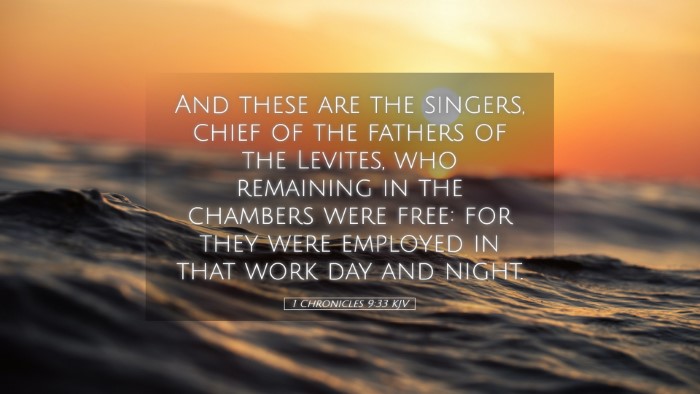Commentary on 1 Chronicles 9:33
Bible Verse: "And these are the singers, chiefs of the fathers of the Levites, who remained in the chambers of the temple, and they were free from other service; for they were employed in that work day and night."
Contextual Overview
The passage of 1 Chronicles 9:33 finds its place within the genealogical register and organizational structure of the Levites. The Chronicler emphasizes the importance of worship and the roles individuals play in the spiritual life of Israel. This verse particularly highlights the dedicated service of the singers in the temple worship, which serves as a model for understanding the seriousness of ministry and musical praise in the life of the community.
Insights from Commentaries
Matthew Henry's Commentary
Concerning the Singers: Henry insightsfully notes that the singers in the temple were full-time servants of the Lord. They were set apart for the sole purpose of leading the worship and praises of the people. This separation indicates not just a functional role but a high calling, emphasizing the need for skilled and dedicated individuals in worship settings.
Application to Today: The expectation of dedication in worship ministry is a principle that can be applied to modern church life as well. Churches today should strive to create environments where those who lead worship are adequately supported and free from distractions, to fulfill their high calling effectively.
Albert Barnes' Commentary
Role of the Levite Singers: Barnes explains that the Levites, specifically the singers, had households that formed a distinct group devoted entirely to worship. He draws attention to the "chambers of the temple," denoting a space set apart for their activities and underlining the importance of continuity in worship practices.
Cultural Significance: The cultural context here is essential—worship was not just an act but a community affair where the singers contributed to the spiritual life of all Israel. Barnes encourages recognition of how these roles fostered a sense of belonging and spiritual vitality within the community.
Adam Clarke's Commentary
Significance of Constant Service: Clarke remarks on the phrase "day and night," highlighting the continuous dedication of the singers. This commitment resonates with the biblical principle of persistent prayer and unwavering service, drawing parallels to the early church's devotion in Acts 2:42.
Feasibility of Work: He also discusses the practical aspect of this dedication, where such commitment was possible due to the division of labor among the Levites. This organized structure allowed for the flourishing of worship without the distraction of secular tasks. Clarke points out the necessity for the church to cultivate a similar structure to support its worship leaders today.
Theological Implications
Worship as a Priority: The chronicler's mention of the singers emphasizes the priority of worship in the life of the community. This reflection calls pastors and church leaders to intentionally create space and time for worship. It prompts an evaluation of how modern churches allocate resources towards worship arts.
Role of the Holy Spirit: The dedication of the singers can also lead to a consideration of how the Holy Spirit inspires and empowers worship. As the singers were free from secular duties, it parallels the church's need today for those led by the Spirit in worship, allowing creativity and authenticity in presenting praises to God.
Practical Applications for Pastors and Leaders
- Developing Worship Teams: Pastors should discern and develop worship teams that can focus solely on worship. Evaluate current structures and find ways to support worship leaders through training and financial resources.
- Encouraging Musical Ministry: Create environments where the arts can flourish. This can include workshops, engagement with local musicians, and incorporating various forms of artistic expression in worship.
- Maintaining a Worshipful Atmosphere: Encourage a culture of continuous worship within the congregation, where music and praise are integral parts of community life, reflective of how the Levites lived.
Concluding Thoughts
The role of the singers as depicted in 1 Chronicles 9:33 serves as a compelling reminder of the importance of dedicated worship in the life of the church. By examining historical and cultural contexts through the lens of skilled commentators, contemporary pastors, students, and theologians can glean significant insights for fostering a vibrant worship culture today.


